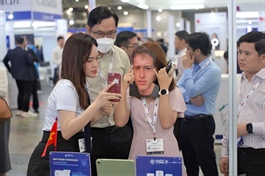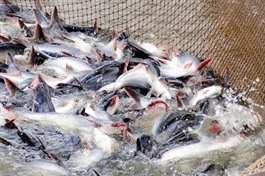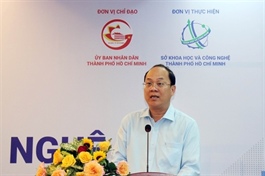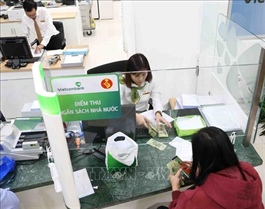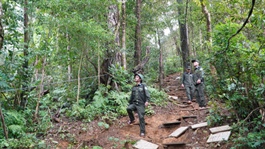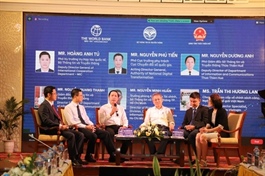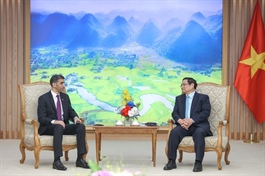Viet Nam has challenges to overcome on the path to growth
Viet Nam has challenges to overcome on the path to growth
In 2022, Viet Nam's GDP growth revved up to 8.02 per cent, the highest in 15 years, symbolising a strong recovery from the COVID-19 pandemic, while the Government forecasts that in 2023 the economy will continue to grow at an impressive 6.5 per cent.
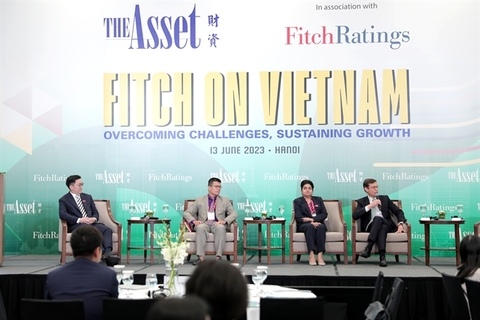
Experts at the conference organised by The Asset and Fitch Ratings, held in Ha Noi on Tuesday. — VNS Photo Minh Trang |
Despite current economic turbulence, Viet Nam has managed to maintain macroeconomic stability and keep its currency robust. However, both external and internal challenges persist.
At the end of May, global ratings agency Fitch affirmed Viet Nam's Long-Term Foreign-Currency Issuer Default Rating at 'BB', with a positive outlook, reflecting strong medium-term growth prospects, supported by FDI inflows, favourable demographics and strong external liquidity.
This exceptional growth and looming obstacles were discussed at a conference held in Ha Noi on Tuesday, co-organised by The Asset and Fitch Ratings.
Speaking at the event, Nguyen Nhu Quynh, president of the National Institute of Finance, Ministry of Finance, said: “Viet Nam faces many challenges this year, from both internal and external factors.
“On one side, the slowdown of the global economy, the prolonged effects of the COVID-19 pandemic, and the ongoing escalation of the conflict between Russia and Ukraine are having negative impacts on the Vietnamese economy.
“Also weighing on the country's development is persistently high inflation, causing many central banks to tighten monetary policies and hike rates.”
FDI surge
Viet Nam saw the disbursement of Foreign Direct Investment (FDI) reach a five-year high in 2022. Manufacturing projects are garnering the lion’s share with notable investment from companies such as Nike and Lego. It is not just the allure of cheap labour and land, but also Viet Nam's green policy path that chimes with these corporations' philosophies, setting the trend for continued growth.
Sajal Kishore, Head of Asia-Pacific Infrastructure and Project Finance at Fitch Ratings, remains optimistic about the impact of FDI, saying: “FDI is coming in the infrastructure space and Viet Nam is clearly benefiting from the supply chain rebalancing that's happening. We see a lot of that coming in the transportation, logistics, and manufacturing sectors. I think that will continue. The challenge there is really around whether these kinds of infrastructure investment projects can really be sustainable on their own.”
Speaking at the conference, experts provided opinions on how to sustain this FDI flow, especially as global economic woes are forecast to continue for the foreseeable future.
Alexandre Macarie, Chief Financial Officer at Techcombank, suggested Viet Nam focuses on “facilitating investments for investors and cutting bureaucracy, making administrative processes more streamlined.
“[Another solution is] addressing sustainable development issues.”
The focal point of this development is how to power the country’s future growth while following a sustainable trajectory and meeting net-zero goals.
Muralidharan Ramakrishnan, Head of South & South-East Asia energy and utilities, Fitch Ratings, said: “It's not just about moving away into green energy, but it's also about making it affordable because affordable power will be key to sustain this level of economic growth.
“If they're unable to achieve either of these in terms of maintaining affordability or unable to transition, it's going to have a huge impact on either the cost of financing or impact growth in some other way because it's going to make it more expensive for the population in general.”
The green growth path extends into consumption, with businesses taking more notice of environmental, social and governance (ESG) practices and the Government following suit.
“From the government perspective, we are developing policies to promote sustainable consumption. And one of the key areas we are working on is the circular economy,” said Nguyen Anh Duong, Director of the Department for General Economic Issues and Integration Studies at the Central Institute for Economic Management.
Inflation under control
Unlike many other countries, Viet Nam maintained a low inflation rate, at 3.15 per cent in 2022. It stood out as the only nation in the Asia Pacific, and one of just four globally, to have its rating upgraded by Moody's.
In addition to a stable economic climate, Viet Nam is striving to improve its legal framework to lure green finance. This includes implementing legislation on green banking and green credit, along with the establishment of a carbon trading market, echoing its COP26 commitments to bring net emissions to zero by 2050.
Sustainable growth, however, faces several challenges, including imported inflation and an increasing public debt-to-GDP ratio. Slow disbursement of public investment capital and falling exports also pose difficulties, placing pressure on the economy.
Sectors with high exposure to imports and exports are particularly vulnerable. The banking sector, while more resilient than it was five to ten years ago, is seeing a rise in non-performing loans, though experts believe this is likely to remain under control. The overall consensus is that after a few challenging quarters, the growth is set to resume.
Challenges loom
Despite the promising picture painted by GDP growth and FDI, there have been setbacks. The equity market concluded 2022 down 32.78 per cent, its worst performance since the 2008 financial crisis. Negative issues linked with the property market have also surfaced, with policy-driven crackdowns leading to heightened risk.
While problems in the property market are a cause for concern, Willie Tanoto, Fitch's Asia-Pacific bankgs director, is more measured about the knock-on effects for the country’s banking sector.
“The banking sector's exposure to the property market is a little on the high side, but it's not terribly high. In ASEAN, on the high end, you have Singapore and Malaysia, where about half the loan portfolio is exposed to the property market. And on the low end, you have Indonesia, the Philippines, and Thailand, which are in the low 20s. Viet Nam is just over 30 per cent,” Tanoto explained.
Viet Nam's banking sector, while resilient, is grappling with weak asset quality. However, profitability remains strong and the central bank acted promptly to inject liquidity into the system.
Viet Nam's economic rise may be filled with turbulence, but the overall trajectory remains upward. As experts agree, the country seems poised to harness its challenges, striving towards a sustainable and green future. VNS
*Additional reporting by Lyly Cao and Minh Trang



